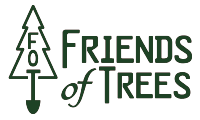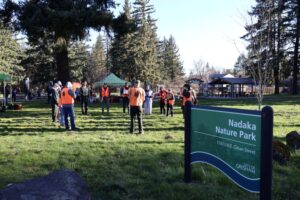Tag: partnerships
Partner Spotlight: Verde
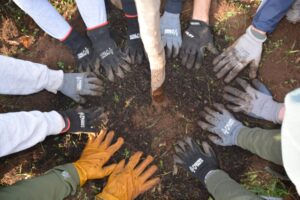
Verde is part of the 11-member coalition for our IRA Community Forestry Grant
We recently had the chance to connect with one of our partners about the opportunities the community forestry coalition affords. After speaking with Amandeep Sohi, Community Engagement Coordinator at Verde, it’s clear that their organization is striving to make a difference in the community.
Verde serves communities by building environmental wealth through social enterprise, outreach, and advocacy. Friends of Trees and Verde have been partners long before this coalition. In recent years, Verde helped Friends of Trees lead our first Spanish-speaking tree planting event. They also assisted in gathering volunteers and training five Latinx women to become planting crew leaders.
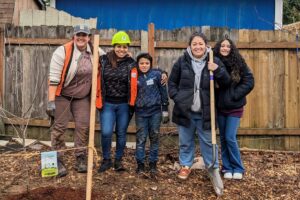
“When we talk about environmental wealth, we’re talking about access to green spaces and people’s ability to go into nature,” Amandeep said. “Not necessarily big, destination-parks, but also pocket parks right by our homes that we can walk to. We want to connect people to those spaces and opportunities—community gardens, naturescapes, and tree planting.”
Verde is part of the 11-member coalition led by Friends of Trees that was awarded a $12 million Urban and Community Forestry Grant from the U.S. Department of Agriculture as part of the Inflation Reduction Act grants. The grant will fund community forestry work including tree planting, natural area restoration, post-planting care, community education, opportunities for direct community input and participation, and workforce training.
Amandeep also spoke to the importance of working in these particular neighborhoods. “It’s super exciting to be working in Justice40 neighborhoods. Planting trees and native shrubs really impacts peoples lives and doing it together builds community.” The Justice40 Initiative is a goal enacted by the Biden Administration to deliver at least 40 percent of the overall investments from key federal investments to disadvantaged communities.
As for the future of the coalition, Verde is excited to work with all of the partners. “Every partner touches on different communities, different aspects of green spaces. Depave is breaking up asphalt and pavement to mitigate heat island effects. Wisdom of the Elders is bringing indigenous knowledge and ways of stewarding the land back to our communities. We’re hoping to tap into our partners’ expansive communities to reach a diverse group of participants.”
A Memorial for Lives Lost in the 2021 Heat Dome
72 trees planted for 72 lives lost in Multnomah County
On March 16th at Nadaka Nature Park in Gresham, dozens of volunteers gathered on an especially gorgeous morning, eager to plant trees. While all of our events are climate action, this one had particular significance. All of these new community trees will serve as memorial to the lives lost to the 2021 Heat Dome. The Arbor Day Foundation funded the planting of 50 yard trees in addition to the 72 memorial street trees, providing much needed shade to these neighborhoods.
“The 2021 heat dome has brought us into stark understanding of the vulnerabilities of our neighborhoods, where the shade of trees is a precious resource,” says Yashar Vasef, Executive Director for Friends of Trees.
It’s been nearly three years since that historic heat wave with temperatures as high as 119 degrees Fahrenheit, but for many the memory is still fresh. Several families who lost loved ones during the heat dome joined the volunteers at Nadaka to mark the occasion with intentionality and reflect on the purpose of the planting event. The morning was not a somber one, because, as Multnomah County Chair Jessica Vega Pederson put it in her remarks, “planting a tree is a hopeful act.”
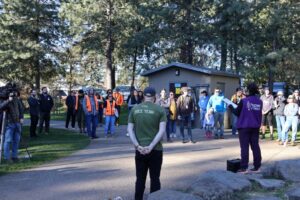
As summer approaches, and with it a chance for another heat wave, it’s important to remember both short and long-term preparedness. We must protect the trees we have, and continue to grow our canopy, especially in neighborhoods that are designated as heat islands.
“In the face of such tragedies, it is imperative that we act decisively on the things we can control,” Yashar says. “Our efforts to plant trees are a stance against the worst outcomes of climate change.”
After remarks from leaders, crews of volunteers headed out into East County neighborhoods to plant street and yard trees that will shade the community. And family members gathered to plant an American hornbeam at Nadaka Nature Park in memory of their loved ones. One family member said they plan to return to the park each year for a family barbecue and to visit and care for the memorial tree.
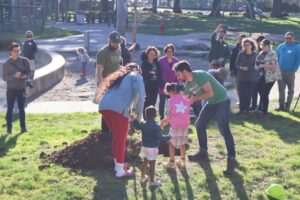
“Each tree we planted helps build a shield against the worst humanitarian impacts of extreme heat,” Yashar says, “and serves as a testament to our shared commitment to building a safer, more resilient community.”
***
The memorial planting event was organized by Friends of Trees, Multnomah County, and the City of Gresham.
Tending The Land. Together.
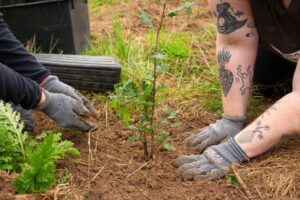
By Yashar Vasef, Executive Director, Friends of Trees
The first planting event of the season always sets the stage for me and opens me up to all the connections that can happen when you bring people together. My first event this year drove that home and more. Friends of Trees helped put on a land tending event at Portland Community College – Rock Creek in partnership with Indigenous community groups and other local partners.
Together, we worked to restore what had been a cow pasture on campus at PCC back to an oak wetland. Working with Wisdom of the Elders, the Five Oaks Museum, and Kimimela Consulting gave us the chance to learn about the history of the land and call back to what the original stewards of the lands would have planted. We planted evergreen huckleberry, beaked hazelnut, and of course, Oregon white oak. Once these plants get established, Indigenous communities will be able to forage this land.
More than planting, the day was all about connection.
I met one of our crew leaders, Emily, who has been volunteering with Friends of Trees since she was young. She spoke to me about how much she’s loved getting to see the plants and trees she’s planted grow over time. The event felt truly intergenerational, from one of our long-time crew leaders to a student who saw the land tending event on the school calendar and told me that she couldn’t have been happier to come join.
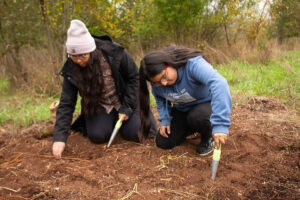
It was the first planting event for our PGE Project Zero intern Jose. Meng Vue, the Green Space specialist who led this awesome event, talked to me about how Jose is passionate about nature and youth education and that he’s brought such a positive energy to our team. His hard work hasn’t just helped us grow plants, it’s helped our team and our projects flourish too. It was awesome to see him learn the ins and outs of hosting a community event.
I got to spend quality time with Adrienne Moat, the Workforce Development Manager at Wisdom of the Elders and a board member at Friends of Trees, whose support and guidance is so valuable. One of the PCC professors I met told me how important it was for BIPOC people to get together and plant side by side. I felt that too, especially as I connected with several people there over our immigrant backgrounds. These are the sort of deeper conversations made possible by having community planting events like this, and it’s something that I really cherish.
At the start of every season, I’m reminded that getting my hands in the dirt is so spiritually cleansing for me. Sharing that feeling with others makes it feel even better.
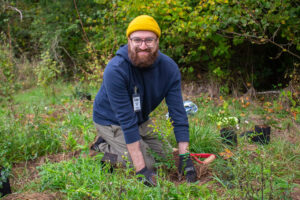
This event was put on in partnership with Portland Community College, Clean Water Services, Tualatin Hills Park & Recreation District, Five Oaks Museum, Wisdom of the Elders, and Kimimela Consulting.
What Coalition Means to Friends of Trees
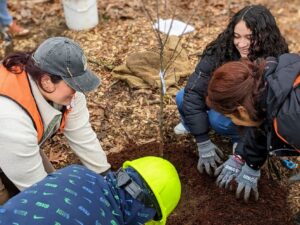
This fall, an 11-member coalition led by Friends of Trees was awarded a $12 million Urban and Community Forestry Grant from the U.S. Department of Agriculture as part of the Inflation Reduction Act (IRA) grants. The grant will fund the engagement of low canopy neighborhoods included in the Biden-Harris Administration’s Justice40 initiative, which will bring resources to communities most impacted by climate change, pollution, and environmental hazards.
The driving theme of the IRA Project is coalition building.
Coalition building goes hand-in-hand with Friends of Trees’ mission to grow community by planting and caring for trees and natural areas together. While we are proud of our past and existing partnerships, this new project is an unprecedented opportunity to take our approach to partnering to the next level by more meaningfully and responsively collaborating with community stakeholders. This includes carving the time and capacity to connect as project partners and people.
We are so excited to work closely with our partners on this project: APANO, Black Parent Initiative, City of Gresham, City of Portland, Columbia Slough Watershed Council, Connecting Canopies, Depave, POIC, Verde, and Wisdom of the Elders. We’ll be spotlighting each of these partners over the next year as we work together on a coalition model that moves us forward as a community team. It’ll be a big, complicated effort, but one that is certainly worth taking on so that we can build a more equitable urban forest.
The efforts toward this community coalition made the IRA coalition possible. And it’s become abundantly clear that it played a significant role in securing this transformative coalition grant that’s unprecedented for Friends of Trees! Learn more about the project here.
Coalition Led by Friends of Trees Awarded $12M Community Forestry Grant

Friends of Trees | FOR IMMEDIATE RELEASE
For more information:
Friends of Trees: Yashar Vasef, Executive Director; [email protected]
Please contract coalition members for more information about their organization’s specific project role and activities (details below)
Portland, Ore. (9-14-23) — An 11-member coalition led by Friends of Trees was awarded a $12 million Urban and Community Forestry Grant from the U.S. Department of Agriculture as part of the Inflation Reduction Act grants. The grant will fund the engagement of low canopy neighborhoods included in the Biden-Harris Administration’s Justice40 initiative, which will bring resources to communities most impacted by climate change, pollution, and environmental hazards.
The partner coalition includes APANO, Black Parent Initiative, City of Gresham, City of Portland, Columbia Slough Watershed Council, Connecting Canopies, Depave, POIC, Verde, and Wisdom of the Elders. The $12 million award will direct funds to these partners and Friends of Trees across five years. This is a partial award, as the original request was for $17.5 million, and the details of the award have not yet been provided.
The coalition’s proposal includes funding for community forestry work including tree planting, natural area restoration, post-planting care, community education, opportunities for direct community input and participation, and workforce training.
“This award is a validation of community tree planting as a model,” says Friends of Trees Executive Director Yashar Vasef. “Especially in the face of intensifying climate change, authentic community partnerships have a huge part to play in growing and maintaining our urban forests.”
The project includes:
- community tree planting (training and engaging volunteers) to plant up to 2,300 street and yard trees and 21,000 native shrubs in neighborhoods and natural areas, specifically in identified equity areas: East Multnomah County, West Eugene, and Springfield
- robust post-planting care, including watering, mulching, and natural area maintenance
- community education
- opportunities for direct community input and participation
- workforce training
In addition to community tree planting and tree care, thousands of additional trees and native shrubs will be planted and cared for by coalition partners through other methods.
“This project represents a tremendous investment in growing our community’s canopy,” Vasef says. “That means engaging the community in efforts to both plant and care for trees.”
Agriculture Secretary Tom Vilsack announced that the USDA’s Forest Service is awarding more than $1 billion in competitive grants to plant and maintain trees, combat extreme heat and climate change, and improve access to nature. Friends of Trees’ partner application is one of 385 proposals that were accepted across the nation.
In addition to affirming the effectiveness of the community tree planting model, this award demonstrates that policymakers are listening to the science. It’s widely accepted that trees play a vital role in combating climate change and providing public health benefits. A recent study using 14 years of Friends of Trees planting data associates neighborhood tree planting with fewer deaths.
“This isn’t just the coalition’s award, this is our communities’ award,” says Vasef. “This coalition represents a broad, diverse cross section of our communities, and these communities will be directly involved with, and will directly benefit from, this project.”
~~~~~~~~~~~~~~~~~~~~~~~~~~~~~~~~~~~~~~~~~
Friends of Trees (FriendsofTrees.org)
Friends of Trees inspires people to improve the natural world around them through a simple solution: Planting Trees. Together.
Friends of Trees was founded in 1989 by a local community member who loved trees and started planting them in neighborhoods. Today, Friends of Trees is a nationally recognized, regional leader in improving the urban tree canopy and restoring sensitive natural areas—through programs delivered by thousands of volunteers. Friends of Trees has planted 945,000+ trees and native plants in neighborhoods and natural areas in six counties across two states in the 35 years since its founding. Learn more about The Friends of Trees Way.
Please contract coalition members for more information about their organization’s specific project role and activities:
- APANO: Duncan Hwang, [email protected]
- The Black Parent Initiative: Leigh Bohannon, [email protected]
- Columbia Slough Watershed Council: Max Samuelson or Heather King, [email protected]; [email protected]
- Connecting Canopies: Theresa Huang or Derron Coles, [email protected]; [email protected]
- Depave: Katya Reyna, [email protected]
- City of Gresham: Tina Osterink or Sarah Cagann, [email protected]; [email protected]
- City of Portland: Mark Ross, [email protected]
- Rosemary Anderson High School/POIC: Leigh Rappaport, [email protected]
- Verde: Jasmine Co or Amandeep Sohi, [email protected], [email protected]
- Wisdom of the Elders: Adrienne Moat, [email protected]
